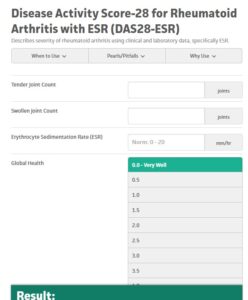The DAS28-ESR Calculator on MDCalc is a clinical tool used by healthcare professionals to assess disease activity in patients with rheumatoid arthritis (RA). DAS28 stands for “Disease Activity Score using 28 joint counts,” and it incorporates both physical examination findings and laboratory data to provide a quantitative measure of inflammation and disease severity. The “ESR” component refers to erythrocyte sedimentation rate, an inflammatory marker often elevated in autoimmune and inflammatory conditions.
To calculate the DAS28-ESR score, clinicians input the number of tender and swollen joints (out of a standardized list of 28), the patient’s ESR level, and a patient-reported general health assessment on a visual analog scale. The resulting score falls within a range that indicates whether the disease is in remission, low activity, moderate activity, or high activity. This tool is especially helpful for monitoring treatment response over time, determining whether a medication is effective, or guiding decisions about adjusting therapy.
The DAS28-ESR score is widely used in rheumatology clinics, clinical trials, and treatment protocols because it offers a validated, objective way to track disease progression. It supports personalized treatment plans, helping clinicians optimize care by tailoring immunosuppressive or biologic therapies to the individual’s current disease activity.
The MDCalc platform makes the calculator easily accessible online with a clean, user-friendly interface and educational notes on interpreting the score. It is a valuable asset not only for rheumatologists but also for general practitioners, nurse practitioners, and other specialists involved in chronic autoimmune disease management.
By enabling evidence-based decision-making, the DAS28-ESR calculator contributes to improved outcomes, reduced joint damage, and better quality of life for patients with rheumatoid arthritis.

